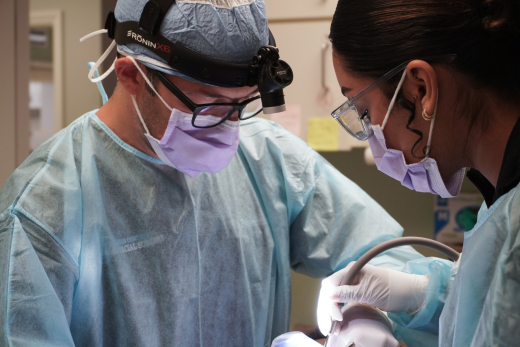
The last permanent teeth to appear in the mouth are the third molars, more commonly known as wisdom teeth. Generally, not growing until the late teen years or early twenties, these late bloomers are a consistent source of dental trouble. This is because many people’s jaws are not sufficiently large to fit wisdom teeth, leading to impacted teeth that can cause infection, pain, or other complications. The American Association of Oral and Maxillofacial Surgeons says that as many as 85% of wisdom teeth will need to be removed eventually, and 9 out of 10 people will need to have at least one taken out. For this reason, wisdom teeth extraction is one of the more common reasons to see an oral and maxillofacial surgeon (OMS).
Why Should I Have My Wisdom Teeth Removed?
Not everyone needs to have their wisdom teeth removed – for some people, they grow in just fine. But they can also cause serious problems, both when they first emerge and later in life. And because wisdom teeth are vestigial – i.e., they do not serve a necessary function for our survival – many patients decide to have them removed at a young age to avoid the possibility of any future complications.
What is the nature of these complications? It all goes back to the fact that our jaws are fitted for 28 teeth, not 32. Consequently, impacted wisdom teeth may grow in at an angle towards other teeth; at an angle toward the back of the mouth; or even stay trapped within the jawbone. This is not just highly painful, but also may lead to infection, gum disease, and can even damage other teeth. Even wisdom teeth that are not impacted may cause problems later in life. All of these are reasons to consult with an OMS about wisdom tooth removal.
Why See An Oral & Maxillofacial Surgeon?
In order to perform complex procedures like reconstructive jaw surgery and wisdom tooth extraction, they undergo extensive education in medicine, dentistry, and surgery. This means that after completing dental school, they spend another 4-6 years in a surgical residency program, where they receive training in general surgery, anesthesia, and internal medicine. This lengthy and rigorous training makes an OMS an expert on procedures related to the jaw and face.
An OMS can evaluate whether your wisdom teeth are impacted and tell you whether surgery is the best option. Typically, an OMS will look for the following signs to indicate whether extraction is the right option:
- Wisdom teeth adversely affect a patient’s tooth alignment even after braces.
- A patient has difficulty cleaning their wisdom teeth.
- The wisdom teeth show signs of infection or decay.
- The wisdom teeth are causing pain.
- There are cavities on the teeth adjacent to the wisdom teeth.
If you are having any of these issues, an OMS will most likely recommend surgery. The procedure is a standard one, done millions of times every year. That said, for some folks, the prospect of surgery can be intimidating. So, let’s go further into the details of how an OMS performs extraction, and elevate any fears or hesitations around this common, safe procedure.
What to Expect from Wisdom Teeth Extraction
After an OMS has determined that surgery is right for you, the procedure itself can be done outpatient quite quickly. The OMS will give you detailed instructions prior to the surgery, which is important to pay attention to. Once you are under sedation, the OMS will perform the extraction. Their expert knowledge of facial and jaw structure allows them to remove the impacted teeth with minimal intrusion, and the actual procedure is usually done in no time at all.
After surgery, it is important to closely follow the instructions given to you by your OMS. Wisdom tooth extraction is a very common procedure, and serious complications are rare, but certain risks can be prevented by proper aftercare. In particular, aftercare can help you avoid a painful condition known as dry socket. Dry socket will go away on its own, but it’s better to avoid it in the first place by listening carefully to your OMS. For proper aftercare, your OMS might advise you to:
- Avoid strenuous activities for about a week.
- Eat only soft foods for 24 hours.
- Not brush your teeth or floss for 24 hours.
- Avoid smoking for at least 72 hours.
- Don’t use a straw.
By following these instructions, which are informed by the expert knowledge of the OMS, most patients should be able to avoid painful complications like dry socket. In most cases, patients should expect a full recovery in a few days to a week. There may be some lingering pain, for which you may be prescribed medication. But by consulting with an OMS and drawing on their expert knowledge and experience, you can alleviate pain, avoid the risk of infection, and move forward with a happier, healthier smile.
Back




